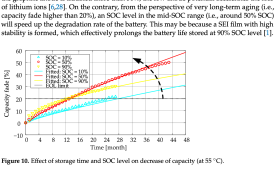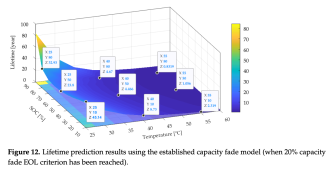curiouscarbon
Science Penguin
- Joined
- Jun 29, 2020
- Messages
- 3,029
Correct for C-rate and move on.
@toms,I have a set of decade old cells that prove just about every statement made in this thread wrong.
@toms,
Kindly,
Share your decade long logged cell dataset or be quiet.
Or Articulate The Experience In A Quantitative Fashion So We May All Benefit From Your Great Experience.
This is a very interesting discussion. What about storage in cold environment (0-40 F)? Do the cells degrade like storage in high heat environments or is degradation much less at these cold temps? What voltage does one leave these batteries when being stored in a cold environment? I have seen many say 40-60% SOC but then you have Battle Born who recommends a full charge before long term storage??? So what does the science say, if anything, on this subject?Yes, lots of data and published literature on this topic:
Starting at page 60:
Quick Excerpt pertaining to temp and calendar aging: "Over time, though, cells degrade and lose capacity in accordance with two different aging phenomena: cycling and calendar aging. It is imperative to understand how these degradation phenomena occur as the loss in capacity results in a loss in vehicle range. Through understanding how these phenomena occur, mitigation efforts can be designed to prevent or lessen their effects. This thesis will focus primarily on studying the effects of calendar aging on commercial LiFePO4 cells. Cells are aged at varying temperatures and states of charge (SOC) to determine the extent of capacity fade and degradation. Additional testing methods are then utilized to attempt to determine which aging phenomena are promoting the losses within the cell. Capacity loss in cells stored at high temperature and fully charged conditions resulted in faster degradation rates. Temperature had the most significant role in the degradation of the cell and then the cell’s SOC. Comparing capacity losses between cells stored at the same temperature, but with different SOCs, found that the cells with higher SOC experienced increased rates of degradation in comparison to their fully discharged counterparts. In addition, storage at high SOC and high temperatures promoted such severe losses that the cells in question were unable to recapture capacity that they had lost reversibly. The primary degradation mode for the cells was the loss of cyclable lithium, and was found to occur under all of the storage conditions. Cells stored at much more severe conditions, though, also demonstrated a loss of active material at the anode. The extent of the loss of the active material was largely predicated on whether or not the cell was stored at fully charged or discharged conditions. Storage of lithium-ion batteries at high temperatures has a dramatic effect on the continual usage of the cells after storage conditions have changed. Despite shifting temperatures or states-of-charge to a lower value, the initial storage conditions leads to increased degradation rates throughout the cell life. Thus, the history of storage for the cell must be also be taken into account when considering losses in capacity."
Look closely at the research paper Will linked, SOC seems to show a minor role in the aging process before 20% degradation and actually a protective effect past 20%. 50% and 90% SOC seem to meet at 20% degradation at the same time temperature however plays a major role, generally the lower the better for storage:This is a very interesting discussion. What about storage in cold environment (0-40 F)? Do the cells degrade like storage in high heat environments or is degradation much less at these cold temps? What voltage does one leave these batteries when being stored in a cold environment? I have seen many say 40-60% SOC but then you have Battle Born who recommends a full charge before long term storage??? So what does the science say, if anything, on this subject?


Thank you jharrell. It took a while for me to decipher the bottom graph which like 3D. I agree that from this data the lower temps are certainly better for storage purposes but the lowest temp there is 25 degrees C or 77 degrees F!Look closely at the research paper Will linked, SOC seems to show a minor role in the aging process before 20% degradation and actually a protective effect past 20%. 50% and 90% SOC seem to meet at 20% degradation at the same time temperature however plays a major role, generally the lower the better for storage:
View attachment 82527
View attachment 82528
At lower temperatures this model shows longer life at both high and low SOC in storage!
From what I gather from Battleborns recommendation high SOC has little to no effect in aging at normal temperatures but going too low from self discharge is very bad, so its less risky to charge to 100% and it will self discharge a few percent per month on its own. Very low SOC is good for storage but you must watch closely that self discharge doesn't take it down too far, mid SOC 20-80% doesn't really help that much unless the battery are kept very warm all the time.
Based on my understanding the aging process is primarily temperature driven and lower is better for storage. That is storing a battery at 0F will have less calendar aging than one stored at 77F given the same SOC. Charging below 0F is not good LFP, storing is actually very good even at 100% SOC, you can see the trend in the 3D plot as temp goes down usable life goes up which should continue well below 0F.Thank you jharrell. It took a while for me to decipher the bottom graph which like 3D. I agree that from this data the lower temps are certainly better for storage purposes but the lowest temp there is 25 degrees C or 77 degrees F!
My question dealt with storage temps, for the most part, well below freezing. I don't think the data presented can be extrapolated out to those temperature ranges.
Please correct me if I am misinterpreting this data.
Have you followed T1 Terry by chance?The reaction in a LiFePO4 cell changes as the C rate changes. If you test at 1C, the results are invalid for 0.5C.
edit: apologies for not going into greater detail - not much time at the moment. It concerns me that there is so much misinformation around especially on this forum regarding LiFePO4.
It’s a shame many of the forums where the exact same discussions were taking place a decade ago are no longer active (and all the people who thought they knew best are now onto their second or third set of cells and unwilling to share their failures online)
What is the obsession with dots going up on a gragh while it charges, dots going down while discharging.
No need to be disrespectful. I also respect real life experience over graphs that do "NOT" define how my use is.@toms,
Kindly,
Share your decade long logged cell dataset or be quiet.
Or Articulate The Experience In A Quantitative Fashion So We May All Benefit From Your Great Experience.
I respect their real life experience too.No need to disrespectful. I also respect real life experience over graphs that do "NOT" define how my use is.
Thanks for the reply Jharrell.Based on my understanding the aging process is primarily temperature driven and lower is better for storage. That is storing a battery at 0F will have less calendar aging than one stored at 77F given the same SOC. Charging below 0F is not good LFP, storing is actually very good even at 100% SOC, you can see the trend in the 3D plot as temp goes down usable life goes up which should continue well below 0F.
Here is Battleborns take:
Hi,Yes, I am starting to get a more clear picture of the storage issue from individuals posting on this site. Most studies presented here seem to indicate that cold weather storage will not harm the batteries at all, at least not of any significant nature as long as all loads are disconnected. I actually reached out to BattleBorn several months ago and was told exactly what this video proports. At the time I thought what chemistry variation are they using to recommend this because most back then were saying to keep your batteries above freezing, period, not just for charging purposes but for storage as well. Since that time we have seen studies done and manufacturers such as BB (who has to warranty their product) that cold weather storage below freezing will not harm the cells.So, at least for now, I am proceeding with that premise until I see objective data that demonstrates otherwise.
Have you followed T1 Terry by chance?


